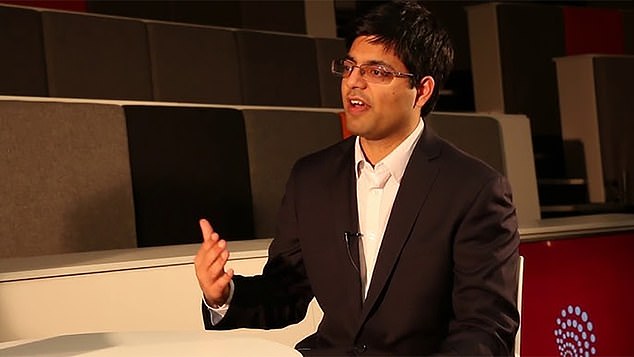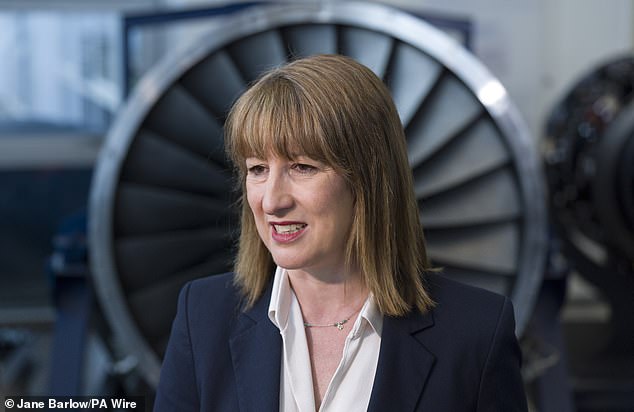Labour’s favourite tax guru has renewed calls for a raid on capital gains to help plug an estimated £30 billion hole in public finances.
Arun Advani, who heads the Centre for the Analysis of Taxation think-tank and devised the hated family farms tax, says changes to the levy are an obvious way to raise cash from the richest people and would be more productive than a separate tax on wealth.
But critics say the proposals would instead drive away businesses and investors.
And data last week revealed previous moves to raise more money from the levy had led to a sharp fall in tax receipts.
Capital gains tax (CGT) is charged on the profit someone makes above a threshold when an asset they own, such as property or shares, is sold.
CGT raised £12.1 billion in the 2023-24 tax year but Mr Advani thinks that could be doubled if capital gains were taxed the same as income tax.

Arun Advani says changes to the levy are an obvious way to raise cash from the richest people and would be more productive than a separate tax on wealth
A 40 per cent higher rate taxpayer is charged 24 per cent on capital gains, whereas a 20 per cent basic rate taxpayer pays 18 per cent CGT.
‘The current way CGT is used encourages tax avoidance,’ says Mr Advani. ‘If the Government were looking at taxing wealth better it would be much better to start by fixing capital gains tax.’
Left-wing backbenchers are pushing Chancellor Rachel Reeves to consider a wealth tax of 2 per cent on assets worth more than £10 million.
But Business Secretary Jonathan Reynolds says: ‘We won’t do anything daft like that.’
Mr Advani says changes should include not only equalising rates of CGT with those of income tax, but also introducing an investment allowance, which would encourage people to back businesses.
Two ministers said Mr Advani’s research was key to the decision to charge inheritance tax on farmland worth more than £1 million, indicating his views hold considerable sway with the Government.
Shadow Business Secretary Andrew Griffith said last night: ‘CGT is a wealth tax by another name, especially as it taxes people on the higher inflation Labour are causing.
‘Arun Advani should be hiding in shame, not dreaming up new ways for this socialist Chancellor to set fire to the wreckage that remains of the economy on her watch.’
Experts say equalising CGT with income tax risked driving more entrepreneurs abroad and hitting economic growth. ‘A move to increase CGT rates, even harmonising these with income taxes, would go against the Chancellor’s aims of boosting growth and investment,’ said Jason Hollands, boss of wealth manager Evelyn Partners.

Rachel Reeves during a visit to Rolls Royce at Inchinnan, Renfrewshire, as she announce £66 million of funding for transport projects in Scotland, on July 25, 2025
HMRC last year said raising CGT by 1 per cent would raise £200 million a year, ‘tiny in the scheme of government finances’, while a 10 per cent rise would cut tax receipts.
‘If taxes on gains are seen to be too punitive, people will conclude the rewards aren’t worth the risk, which would undermine the economy,’ said Mr Hollands.
HMRC data showed previous efforts to raise money from the levy had backfired.
CGT receipts fell 18 per cent to £12.1 billion in the 2023-’24 tax year. Receipts are forecast to have fallen another 10 per cent for the 2024-25 tax year.
Levy could cost firms £10bn
A new wealth tax could deliver a hammer blow to businesses before even a penny is received by the taxman, top law company Vardags has warned.
Its accountants estimate UK businesses would see up to £10 billion added to costs every year as they would have to pay bean counters to check if assets were valued highly enough to fall within the tax’s scope.
The bill would include legal costs arising from disputes with HMRC if there was disagreement over how much assets were worth. This would be paid before the taxman received anything from the levy. ‘Between the high cost of compliance, and the potential for tens or even hundreds of thousands of disputes arising from valuations, a wealth tax could cost billions before a penny was received in revenue,’ said Ben Crowne, a partner at Vardags.
He said any system to enforce a wealth tax, particularly the two per cent levy on assets worth more than £10million backed by Left-wing MPs, would incur ‘huge costs’ and create ‘enormous’ loopholes that could be exploited by those with funds to do so.











